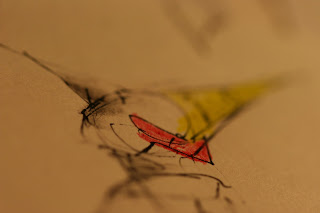Fairy
In the labyrinthine sprawl of the pumpkin patch, where vines coil like serpents through the rich, loamy soil, the wood fairies and flower fairies perceive the world through senses far keener and more vivid than any human could fathom. The wood fairies, their bark-like skin textured with the grain of ancient oaks, feel every tremor of the earth beneath their feet—a subtle pulse as roots shift deep underground, a faint tickle as worms twist through the dirt. Their fingertips, rough as sandpaper, trace the pumpkins’ leathery rinds, detecting the slow swell of growth, each ridge and groove humming with life. The air they breathe carries the resinous tang of pine and the damp, fungal musk of decaying leaves, a scent so potent it lingers on their tongues like a bitter sap. When the wind stirs, they hear it as a chorus of whispers, each leaf’s rustle distinct, a sharp crackle or a soft sigh weaving into a symphony that maps the patch’s every corner.
The flower fairies, delicate as spun sugar, experience the world through a kaleidoscope of sensation. Their petal-soft skin—blazing in shades of crimson, gold, and violet—quivers at the slightest touch, the cool kiss of dew on pumpkin leaves sending shivers up their spines, each droplet’s weight a tiny, thrilling burden. Their noses drink in a tapestry of perfumes: the cloying sweetness of honeysuckle, sharp enough to make their heads spin; the powdery calm of lavender, a balm to their fluttering hearts; and the velvet bite of rose, a scent that stings faintly like a lover’s rebuke. Their eyes, luminous and multifaceted like dewdrops, catch every flicker of light—the moonlight’s silver gleam fractures into a thousand prisms through their gaze, painting the night in hues no mortal could name. Sound, to them, is a living thing: the buzz of a beetle’s wings vibrates through their bones, a low thrum they feel as much as hear, while the distant croak of a frog ripples the air like a pebble dropped in still water.
When the cursed lad sings, his voice—a molten river of sorrow and warmth—strikes their senses like a storm. To the wood fairies, it’s a physical weight, pressing against their barky chests, each note a deep quake that rattles their cores, tasting of salt and ash on their woody lips. They hear the layers within it—the faint rasp of his breath, the tremor of his grief—each nuance as clear as a snapping twig. The flower fairies, meanwhile, feel his song as a wave of heat and chill, prickling their petal-skin like a sudden frost or a sunburst. Its melody dances in their ears, high notes tinkling like glass bells, low ones sinking into their bellies with a honeyed ache. They taste it too—a bittersweet blend of tears and wine, coating their tongues as they sway, entranced.
At night, when the meadow plunges into an inky abyss and the moonlight spills like liquid silver, the fairies’ senses sharpen to a fever pitch. The wood fairies feel the cold bite of the dark against their rugged hides, every shift in temperature a jolt, while their ears catch the faint skitter of mice beneath the vines, a staccato beat against the night’s hush. Their wings—iridescent and tough as beetle shells—buzz with a low, resonant hum as they lift off, the vibration tingling through their frames. The flower fairies, lighter than dandelion fluff, sense the moon’s glow as a soft warmth on their faces, their wings—shimmering sapphire, emerald, and amethyst—fluttering with a sound like silk tearing, a high-pitched whine that tickles their own ears. They taste the pollen dusting the air, a sugary grit that clings to their lips, and feel the damp caress of pumpkin leaves beneath their toes, slick and plump with moisture.
As they dance and sing, their voices weaving a crystalline tapestry—sharp as icicles to the wood fairies, sweet as nectar to the flower fairies—their senses merge into a shared ecstasy. The lad’s mournful aria binds them, a thread of sound and feeling that pulses through the patch, amplifying every scent of moss, every glint of fairy-wing light, every shiver of the living earth. In this sensory storm, the pumpkin patch becomes a realm of infinite wonder, alive with the fairies’ heightened perception—a world where every breath, touch, and tone is a vivid, electric marvel.

















